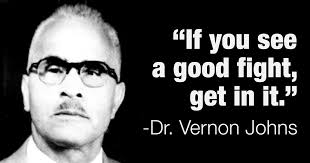Things They Don’t Teach Us in School: Vernon Johns
Editor’s note: Each week the PW Perspective will be showcasing the pioneers, innovators and history makers that you don’t often read about in textbooks.
America often celebrates the heroes who made great sacrifices to change the course of history, but at the same time forgets their forerunners. While many know of Reverend Dr. Martin Luther King, Jr. and how he led the charge on civil rights, few remember the man who paved the way for King’s nonviolent protests throughout the country. Today we take a look at Reverend Vernon Johns.
Johns (1892 – 1965) was born in Darlington Heights, Virginia. Upon graduating from both Virginia Theological Seminary and then Oberlin College three years later, he became a pastor. Throughout the states of West Virginia, Pennsylvania and his home state of Virginia, he pastored several churches prior to taking over Dexter Avenue Baptist Church in 1947.
It was at Dexter where Johns began his impact on the civil rights movement. During his pastoral commission, he addressed the civil rights situation in Montgomery, Alabama over the pulpit. He called upon his congregation to take action as well. Due to continuous discrimination on city buses, he was part of a protest and demanded a refund. In addition, he also was known for his fiery sermons, inspiring people to not remain silent but commit to ending injustice. It was his dedication to activism and willingness to challenge the power structure of the day that opened the door for the middle-class congregation to accept Dr. King’s social activism, including establishing the famed Montgomery bus boycott of 1955.
In 1954, King succeeded Johns as minister of Dexter. King described Johns in his memoir Stride Toward Freedom that his successor was “a brilliant preacher with a creative mind” and “a fearless man, never allowed an injustice to come to his attention without speaking out against it.” During Johns’ latter years he continued to speak throughout the country at churches and colleges. He also was active in Farm and City Enterprises, Inc., and economic cooperative that allowed farmers to sell their goods directly to the consumer. He preached until his death in 1965.
For more information on the life of Vernon Johns, the “Father of the Civil Rights Movement,” please click on the embedded link.



